As a hiring manager or recruiter, you know that finding the right executive assistant can be a game-changer for a senior executive's workflow. Executive assistants play a crucial role in managing schedules, prioritizing tasks, and ensuring that the leadership team operates optimally. It's essential to find a motivated candidate with exceptional organizational skills, leadership qualities, and excellent communication skills. However, many firms struggle with identifying the right fit for their company culture and specific executive needs.
In this article, we'll guide you through the process of hiring an exceptional executive assistant. You'll learn about the skills and qualifications needed for the role, how to craft a compelling job description, and the best platforms for finding top candidates. Additionally, we'll cover how to utilize assessment tests, such as those available on Adaface, to evaluate potential hires.
Table of contents
Why Hire an Executive Assistant?
An Executive Assistant can significantly boost your productivity and streamline your operations. They handle administrative tasks, manage schedules, and coordinate communications, allowing you to focus on high-level strategic decisions and core business activities.
Consider hiring an Executive Assistant when:
- You're spending too much time on administrative tasks
- Your schedule is becoming unmanageable
- You need better organization of meetings and travel arrangements
Before committing to a full-time hire, assess your needs carefully. You might start with a part-time assistant or conduct a skills assessment to ensure you find the right fit for your specific requirements. If your workload consistently demands support, a full-time Executive Assistant could be the best investment for your productivity.
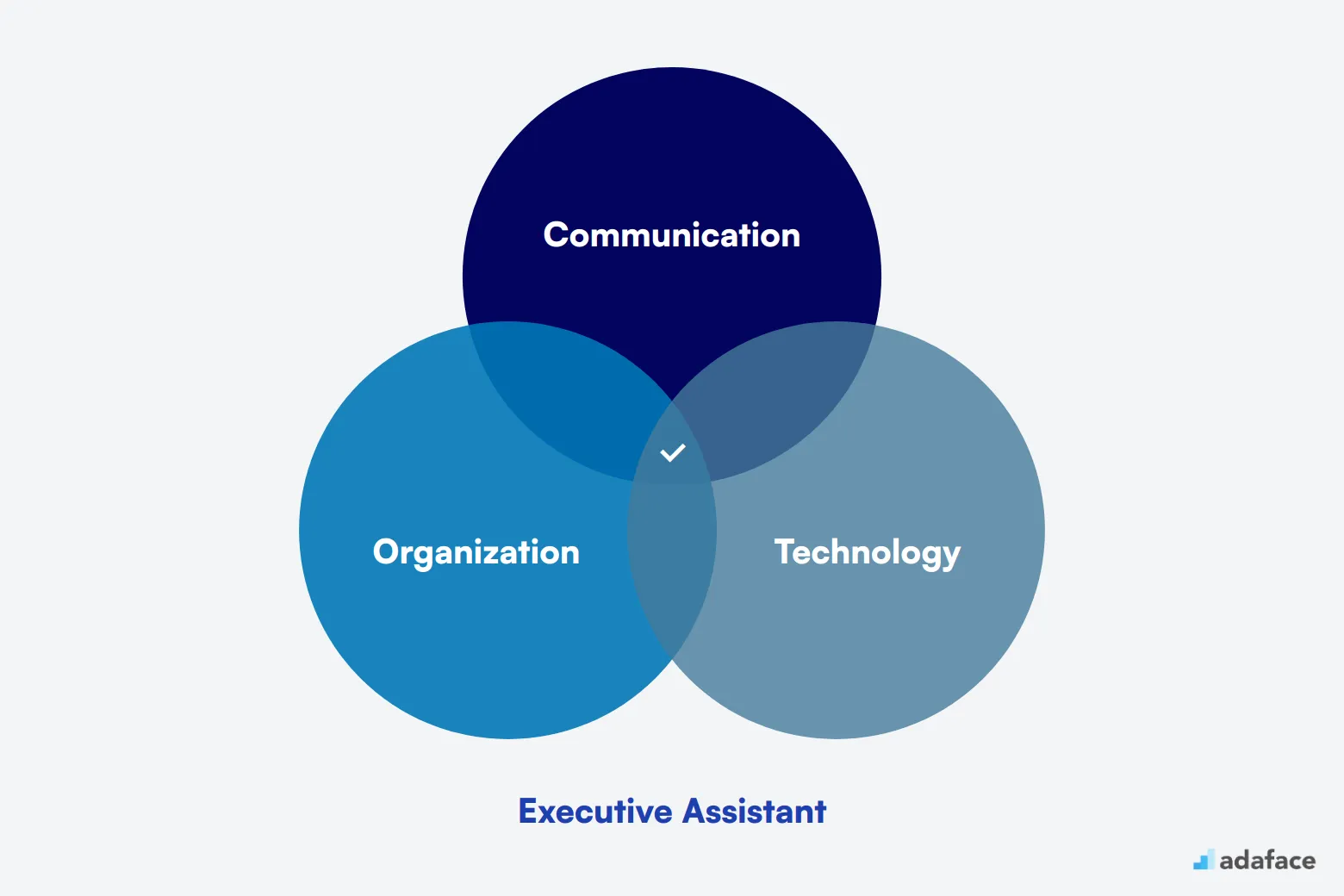
Key Skills and Qualifications for an Executive Assistant
Creating a candidate profile for an Executive Assistant can be challenging. Recruiters often mix up what's necessary versus what's nice to have, leading to a pool of candidates that may not fit the actual needs of the role. It's vital to clearly outline the required and preferred skills and qualifications to attract the right talent.
Here are the essential skills and qualifications to look for:
- Required Skills:
- Bachelor's degree or equivalent experience
- Minimum of 3 years experience as an executive assistant or in a similar role
- Exceptional organizational and time-management skills
- Strong written and verbal communication skills
- Proficiency in office productivity software like Microsoft Office Suite
- Preferred Skills:
- Experience in managing projects or events
- Proficiency in additional software such as Google Workspace
- Ability to handle sensitive information with discretion
- Experience in bookkeeping or financial management
- Familiarity with CRM and project management software
| Required skills and qualifications | Preferred skills and qualifications |
|---|---|
| Bachelor's degree or equivalent experience | Experience in managing projects or events |
| Minimum of 3 years experience as an executive assistant or in a similar role | Proficiency in additional software such as Google Workspace |
| Exceptional organizational and time-management skills | Ability to handle sensitive information with discretion |
| Strong written and verbal communication skills | Experience in bookkeeping or financial management |
| Proficiency in office productivity software like Microsoft Office Suite | Familiarity with CRM and project management software |
How to write an Executive Assistant job description?
Once you have a candidate profile ready, the next step is to capture that information in the job description to attract the right candidates. A well-crafted job description is key to finding the perfect Executive Assistant.
• Highlight key responsibilities: Clearly outline the essential duties of the role, such as managing schedules, coordinating meetings, and handling correspondence. Emphasising how these tasks support the executive and the organisation's objectives makes the position more appealing to potential candidates.
• Balance technical skills with soft skills: While it's important to list required technical skills, such as proficiency in office software and familiarity with project management tools, don’t forget to mention soft skills like communication and adaptability. These qualities are critical for an Executive Assistant who needs to navigate various situations smoothly.
• Showcase your company's unique value: Highlight what makes your company and the Executive Assistant role special. Whether it’s your commitment to employee development, company culture, or exciting projects, these factors can attract top talent who are looking for a good fit within their next position. For a detailed reference, you can look at the Executive Assistant job description for guidance.
Top Platforms to Hire Executive Assistants
Now that you have a well-crafted job description, it's time to list your opening on job sites to attract potential candidates. The right platform can make a significant difference in finding qualified Executive Assistants. Let's explore some of the best options available.
Ideal for reaching a broad and professional audience for full-time roles. LinkedIn allows for targeted searches to find candidates with specific skills and experiences.

Indeed
Best for a wide reach across various industries and role types. Indeed offers comprehensive filtering options to match job descriptions with potential candidates.

Upwork
Perfect for finding freelance Executive Assistants. Upwork provides a platform to hire for short-term projects or part-time roles with flexible terms.

Other notable platforms include FlexJobs for flexible work arrangements, Glassdoor for full-time roles with company insights, SimplyHired for broad reach, ZipRecruiter for quick distribution, Remote.co for telecommuting positions, and AngelList for startup environments. Each platform caters to different needs, so consider your specific requirements when choosing the right pre-employment assessment tool to complement your hiring process on these sites.
Keywords to Look for in Executive Assistant Resumes
Resume screening is a key step in finding the right Executive Assistant. It helps you quickly identify candidates with the skills and experience you need, saving time in the hiring process.
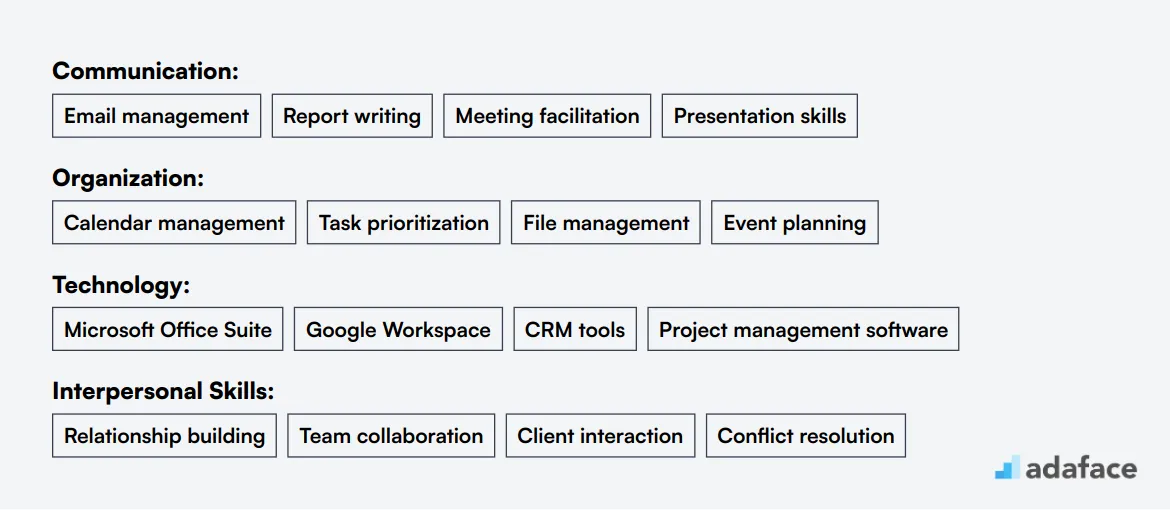
When manually screening resumes, focus on keywords that match your job requirements. Look for terms like 'calendar management', 'Microsoft Office Suite', and 'event planning'. This approach helps you shortlist candidates who align with your needs.
AI tools can streamline your resume screening process. You can use AI-powered screening tools to quickly analyze resumes based on specific keywords and criteria, making your selection process more efficient.
Here's a sample prompt for AI-assisted resume screening:
TASK: Screen resumes for Executive Assistant role
INPUT: Resumes
OUTPUT:
- Email
- Name
- Matching keywords
- Score (out of 10)
- Recommendation
- Shortlist (Yes/No/Maybe)
KEYWORDS:
- Communication (email management, report writing)
- Organization (calendar management, event planning)
- Technology (Microsoft Office Suite, CRM tools)
- Interpersonal Skills (relationship building, team collaboration)
Customize this prompt based on your specific Executive Assistant job description for best results.
Recommended Skills Tests for Assessing Executive Assistants
Skills tests are a great way to evaluate Executive Assistant candidates beyond their resumes. They help you assess practical abilities needed for the role. Here are five key tests we recommend for screening Executive Assistant applicants:
Administrative Assistant Test: This administrative assistant test evaluates core skills like scheduling, document management, and basic office software proficiency. It's useful for gauging a candidate's readiness to handle day-to-day administrative tasks.
Communication Test: Executive Assistants need top-notch communication skills. A communication test assesses written and verbal abilities, ensuring candidates can interact professionally with executives, clients, and team members.
Attention to Detail Test: Precision is key for Executive Assistants. An attention to detail test helps identify candidates who can spot errors, maintain accurate records, and produce flawless work.
Time Management Test: Executive Assistants must juggle multiple tasks and priorities. A time management test reveals a candidate's ability to organize, prioritize, and meet deadlines effectively.
Excel Test: Proficiency in Microsoft Excel is often required for Executive Assistants. An Excel test can verify a candidate's skills in data entry, formatting, and basic formula usage, which are valuable for report creation and data management.
Case Study Assignments for Hiring Executive Assistants
Case study assignments are a popular choice for assessing potential Executive Assistants. However, these tasks can be time-consuming and may deter candidates from completing them, leading to a smaller pool of applicants. Despite these drawbacks, carefully crafted case studies can reveal a candidate's problem-solving abilities and decision-making skills. Let's explore some recommended case studies for this role.
Calendar Management Simulation: This case study requires candidates to prioritize and manage a complex schedule for an executive. It assesses their ability to handle conflicting appointments and showcase their organizational skills, which are key qualities in an Executive Assistant. Skills required for Executive Assistants are crucial to their success.
Travel Itinerary Planning: Candidates are tasked with creating a travel itinerary for a fictional business trip. This assignment evaluates their attention to detail, research abilities, and understanding of logistical challenges, which are essential for supporting busy executives.
Problem-Solving Scenario: This case involves a hypothetical workplace issue that the candidate must resolve. It tests their critical thinking and communication skills. Such scenarios can provide valuable insights into how a candidate might handle complex situations. Learn more about the hiring process to understand how these case studies fit into a comprehensive evaluation.
Structuring the Interview Stage for Executive Assistant Candidates
After candidates pass the initial skills tests, it's time for technical interviews to assess their hard skills more thoroughly. While skills tests are great for initial screening, interviews help identify the best fit for your specific Executive Assistant role. Let's look at some key questions to ask during this stage.
- 'How do you prioritize tasks when managing multiple executives' schedules?'
- 'Describe a situation where you had to handle confidential information.'
- 'What tools do you use for efficient document management?'
- 'How do you approach travel planning for executives?'
- 'Can you walk me through your process for preparing presentations?'
- 'How do you handle communication with high-level stakeholders?'
These questions help assess time management, discretion, technical skills, organizational abilities, and communication skills - all crucial for an Executive Assistant role.
How much does it cost to hire an Executive Assistant?
The cost of hiring an Executive Assistant varies significantly based on location and experience level. In the United States, salaries range from $41,500 for entry-level positions to over $104,000 for those with more experience. Countries like Australia and the Philippines show similar trends with regional differences, with annual salaries stretching from AUD 68,111 to AUD 111,882, and PHP 281,474 to PHP 857,673 respectively. When budgeting for hiring, consider these ranges to ensure competitive offers.
Executive Assistant Salary in the United States
The average salary for an Executive Assistant in the United States is approximately $70,000 annually. Salaries can range from about $41,500 for entry-level positions to over $104,000 for more experienced roles. Major cities like San Francisco and New York tend to offer higher salaries, often exceeding $90,000.
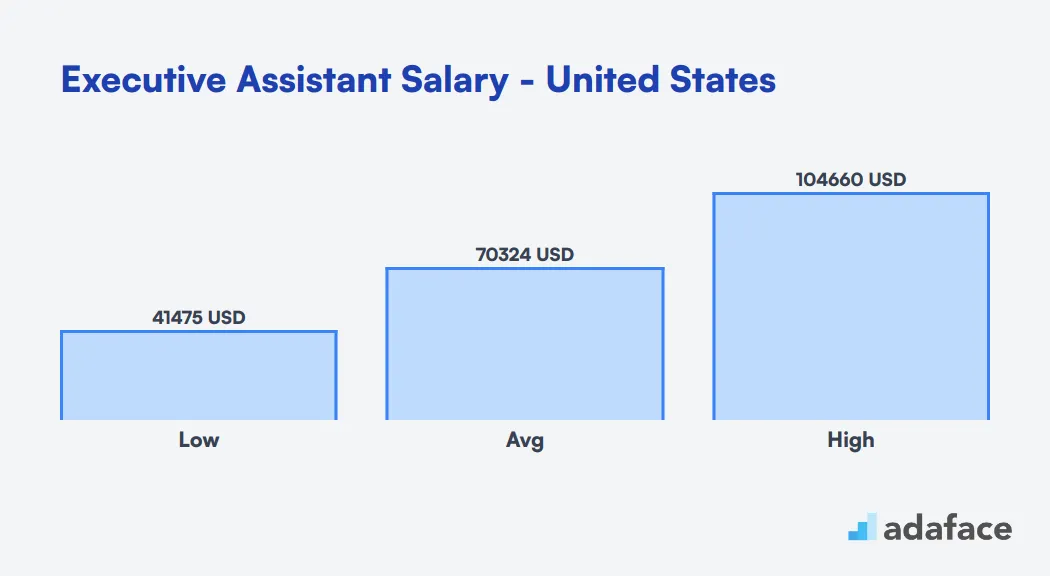
Executive Assistant Salary in Australia
In Australia, Executive Assistant salaries vary across states and cities. The national average salary ranges from AUD 68,111 to AUD 111,882, with a median of AUD 87,295.
Top-paying locations include Parramatta NSW (median: AUD 101,945) and Brisbane QLD (median: AUD 99,424). Sydney and Melbourne offer competitive salaries, while smaller cities like Darwin NT and Newcastle NSW tend to have lower pay scales.
Factors influencing salary include experience, industry, and company size. Always research local market rates when hiring or negotiating compensation for Executive Assistant roles.
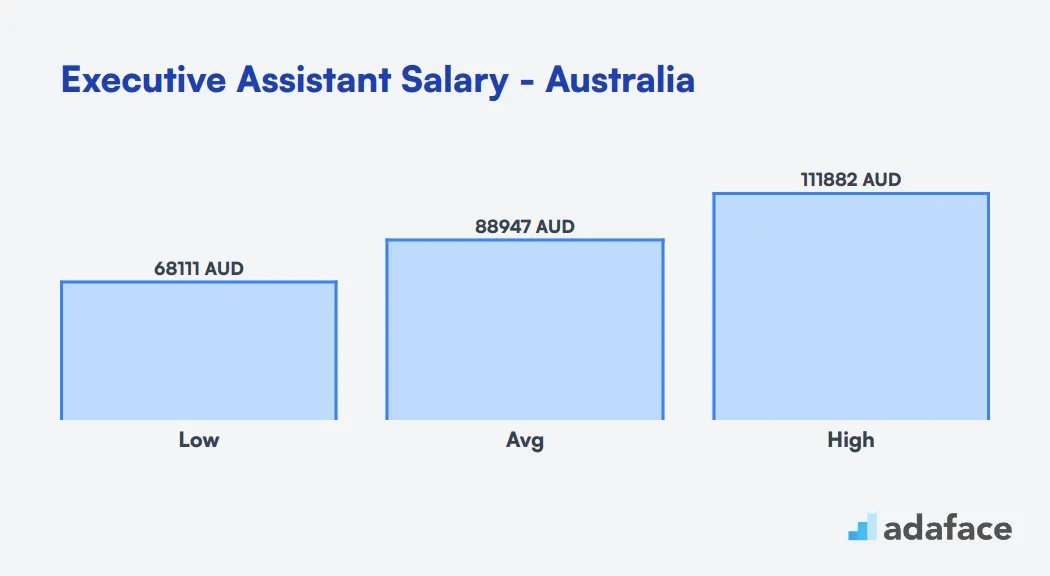
Executive Assistant Salary in the Philippines
In the Philippines, the average salary for an Executive Assistant is around PHP 328,183 per year. However, salaries can vary significantly based on location. For example, in Manila, the range is from PHP 281,474 to PHP 857,673, while in Cebu City, it's between PHP 182,223 and PHP 663,689. Understanding these regional differences can help you budget effectively when hiring.
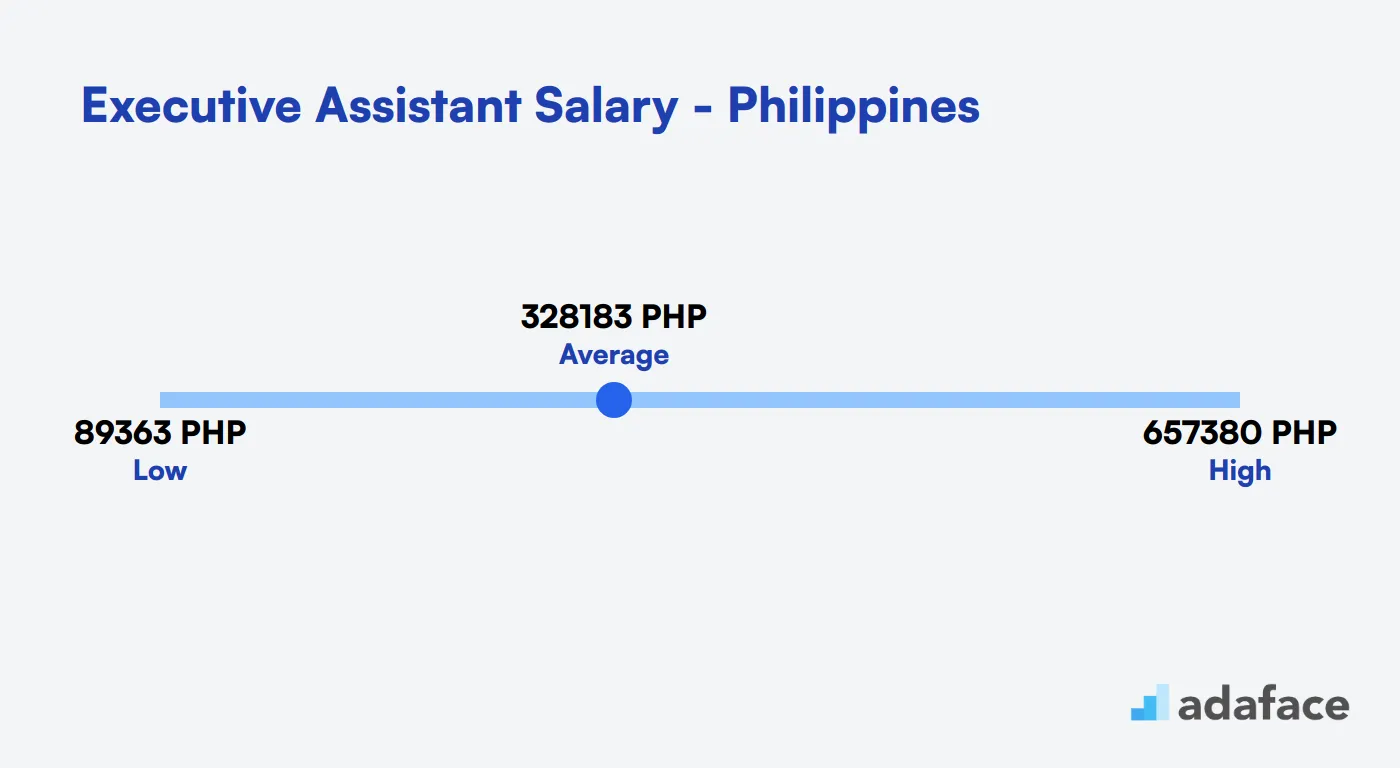
What's the difference between an Executive Assistant and a Chief of Staff?
Many people confuse the roles of an Executive Assistant and a Chief of Staff because both positions support executives. However, their scopes and responsibilities differ significantly, which can lead to misunderstandings about their functions within an organization.
An Executive Assistant typically supports one executive and focuses on administrative tasks. Their responsibilities include managing schedules, handling correspondence, and organizing meetings. They may have limited strategic input and often have minimal decision-making authority.
In contrast, a Chief of Staff supports the executive team and plays a critical role in strategic planning and execution. This position often includes team management and significant decision-making authority. A Chief of Staff manages cross-functional initiatives and represents the executive in external meetings, making it a more senior position with broader responsibilities.
| Executive Assistant | Chief of Staff | |
|---|---|---|
| Education Level | Bachelor's degree | Master's degree often preferred |
| Scope of Responsibility | Supports one executive | Supports executive team and organization |
| Strategic Involvement | Limited strategic input | High-level strategic planning and execution |
| Team Management | Minimal to none | Often manages support staff |
| Decision-Making Authority | Limited | Significant |
| Project Management | Administrative projects | Cross-functional, high-impact initiatives |
| External Relationships | Limited external contact | Represents executive in external meetings |
| Career Progression | Senior Executive Assistant | C-suite or senior leadership roles |
Hire the Best Executive Assistants
In this guide, we've covered the key aspects of hiring an Executive Assistant, from understanding the role to crafting job descriptions and conducting interviews. We've highlighted the importance of assessing skills like communication, problem-solving, and attention to detail.
The key takeaway is to use well-crafted job descriptions and skills tests to make your hiring process more accurate. By focusing on these elements, you'll be better equipped to find an Executive Assistant who can truly support and enhance your organization's operations.
Administrative Assistant Test
FAQs
An executive assistant is responsible for managing executive schedules, facilitating communication, organizing meetings, and handling administrative duties to support the executive team.
Key skills include strong organizational abilities, excellent communication, time management, problem-solving skills, and proficiency with office software.
Utilize skills assessments and tests available on platforms like Adaface to evaluate candidates' competencies.
You can find candidates through job boards, professional networking sites, recruitment agencies, and specialized platforms for executive roles.
While both roles support leadership, an executive assistant focuses on administrative tasks, whereas a chief of staff takes on strategic planning and managerial roles.
Include behavioral interview questions, skills assessments, and situational tasks to evaluate the candidate's practical abilities and cultural fit.
A job description should include key responsibilities, necessary skills and qualifications, company culture details, and expectations for the role. For more details, see the executive assistant job description guide.

40 min skill tests.
No trick questions.
Accurate shortlisting.
We make it easy for you to find the best candidates in your pipeline with a 40 min skills test.
Try for freeRelated posts
Free resources



